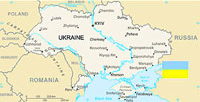Russian and rebel forces seen free to advance from border to Ukraine port of Mariupol

(Business New Europe – bne.eu – Graham Stack in Bezimmine, Ukraine – August 28, 2014) The forces of the self-proclaimed Donetsk People’s Republic – comprising irregular Russian-backed rebels and regular Russian troops – are free to advance from the border town of Novoazovsk to Ukraine’s second largest port of Mariuopol, warn fighters of Ukraine’s irregular Dnipro battalion, which is based in the seaside village of Bezimmine 15 kilometres from Novozovsk.
Fighters of the irregular pro-Kyiv Dnipro battalion told bne that they were on their own against the Russian-backed separatists and what is now accepted also Russian regular forces, which have taken control of the strategically important border town of Novoazovsk, on the Azov sea. Bezimmine, meaning literally “nameless,” is a sleepy seaside village popular among holidaymakers, 15km west of Novaszovsk and around 30km east of Mariuopol. But now it is on the front line of a conflict that is escalating every day.
“We have called for backup from the army in the form of artillery and aviation, but nothing has come,” complained one of around 15 fighters commanding high ground on the eastern outskirts of Bezimmine, looking towards Novoazovsk. Apart from volunteer fighters and National Guard forces reportedly dug in near Bezimmine for around six weeks, no other Ukrainian forces were to be seen on the road between Mariupol and Bezimmine on August 28.
“We were beaten out of Novoazovsk starting Monday [August 25], because of the artillery fire coming from behind the Russian border,” said the fighter with the Dnipro battalion, who declined to be named but said he hailed from Donetsk. “Now we are simply waiting here.”
The group of irregulars had two jeeps, one of which had a heavy machine gun mounted on the back. “All we have here are our automatic guns. Do you think we can stop Russian tanks with them?”
The fighters from the Dnipro battalion questioned by bne said they had not seen Russian soldiers with their own eyes when fighting in Novoazovsk, since they had pulled out due to the artillery fire. But they had accurate reports of a column of over 50 armoured vehicles that had entered Novoazovsk from the Russian side, including tanks, armoured personnel carriers and artillery. “They have dug in now their heavy guns around the town,” said the fighter.
One hour later, a salvo of land-land rockets apparently from the direction of Novoazovsk struck positions behind Bezimmine, apparently where Ukraine’s National Guard were dug in. “Donetsk People’s Republic are coming now,” said the pro-Kyiv irregulars, racing through Bezimmine with an improvised anti-tank weapon fixed to the roof of a jeep. The National Guard had pulled out from their positions to defend Mariuopol itself, the irregulars said before themselves racing out of Bezimmine.
Third front?
Ukraine’s Security Council in a statement on August 28 confirmed that Ukraine had lost control of Novoazovsk and other nearby settlements, saying they were now fully under the control of Russian regular forces.
Main roads from Novoazovsk lead east along the Azov coast to Mariuopol and north to the city of Donetsk, currently besieged by Ukrainian forces. Multiple reports spoke of settlements along the Donetsk road coming under control of the Russian-backed forces. “This is the opening of a third front and the risk of encircling Ukrainian forces around Donetsk,” says analyst Dmitro Tymchuk, director of the Centre of Military Political Research.
The easy advance of the rebels and Russian forces towards Donetsk from the South may demoralise Ukrainian forces, who have believed themselves to be close to victory in recent weeks. Russian media claimed August 28 that the Donetsk People’s Republic forces had recaptured from Ukrainian forces the strategically and symbolically important hill of Savur-Mohila south of Donetsk, scene of an epic Second World War battle. Ukrainian media reported August 28 that an entire regular army battalion of 400 mobilised reservists from West Ukraine, fighting in the east, mutinied and set off home with their equipment, saying that two months without leave under constant artillery fire was enough, and they wanted to be replaced. They were stopped in the Central Ukrainian town of Kirovograd and agreed to surrender their armoured vehicles.
Potentially adding to demoralization, Ukrainian investigative journalists reported August 27 that the deputy head of Ukraine’s so-called “anti-terrorist operation” in East Ukraine, Major General Vyacheslav Nazarkin, is the brother of, and possibly in cahoots with, a high-ranking Russian army officer.
The fact that the road to Mariuopol is now open is equally worrying for Ukraine. Mariupol was already briefly itself under control of the Russian-backed Donetsk People’s Republic until Ukrainian forces entered the town on June 13. A pro-Kyiv demonstration of several hundred was held in the port city August 28, but the city, like most of the surrounding area, is divided roughly equally between those who support the Russian-backed rebels and those supporting Kyiv. The overriding desire on both sides however is for peace and negotiations between the two sides.
Mariuopol is Ukraine’s second largest port city after Odesa, and plays a vital role in an economy dependent on metallurgy, chemicals and arable exports. It is also in itself home to two massive steelworks, Azovstal and MMK. According to military analysts, the Ukrainian stretch of Azov coast may also have strategic significance for the Kremlin in comprising a land bridge from Russia to the Crimean peninsula, annexed by Russian in March, but currently only accessible for Russia by sea or air.
People are starting to leave the seaside holiday villages along the Azov coast fearing the advance of Donetsk People’s Republic, but many have nowhere to go – a large number are forced holidaymakers who have found cheap accommodation by the seaside after fleeing their homes for the seaside in Luhansk or Donetsk. “We have no idea where we can go now,” says Dmitry Kolesnichuk, 46, a building worker from Luhansk, renting accommodation in Bezimmine with this wife and children.
